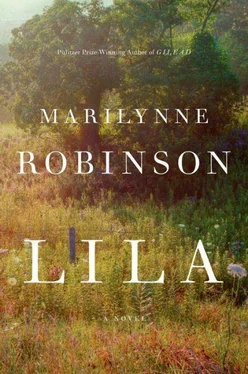He said, “Well, in one sense that may be true.”
“I’d say it’s true.” She wasn’t going to be standing there waiting for it.
“Not in a way I thought would matter. And it doesn’t matter now, Lila. Not really.”
“I guess that’s good, because there ain’t much to tell. I don’t know who my folks were, I don’t know my own last name.”
He said, “I understand that. It makes no difference to me. None at all.”
“Well,” she said, “if there’s something else you want to ask me about, you might as well do it.”
He said, “Yes.” And then he said, “It makes me uncomfortable, you can see that. But I feel as though I need to know — how things stand. I can’t help wondering why you went back there. What you were doing there.”
“I was just going to look at the pelicans on the river, and seeing the shack reminded me that I left some money hidden under a plank in the floor. I could see the place was empty. I looked for the money and it was gone. I thought it would feel good to rest a little anyway, so I sat there on the stoop in the sunshine and I guess I fell asleep. Then I woke up and that boy was standing there looking at me.”
“You didn’t know him at all.”
“Never seen him in my life before. That’s the truth.”
“Yes, of course. Of course.” Then he said, “I hate to seem to be questioning you, Lila. But when I heard you had gone out there, I thought it might mean you weren’t happy. You know, here, with me. I knew from the beginning that things might be difficult, and I thought I could accept whatever happened. But it never crossed my mind there might be a child. I thought I had learned not to set my heart on anything. But I find myself thinking about that child — much of the time. So the idea that you might want to leave — it would be extremely difficult for me to live with that.”
She said, “I ain’t leaving. Farthest thing from my mind.” If this was not entirely true, it was true enough. “I just go off to look at pelicans and everything goes haywire. I don’t know. I thought I might as well get some use out of that money. Took me all summer to save it up.”
“I only asked because, if there was anything I could do to make you want to stay—”
She said, “My child is going to have a big old preacher for its papa, and live in a good, warm house, and eat ham and eggs three times a week. And it’s going to know all them hymns by heart. You’ll see.”
“Well,” he said, “that will be wonderful. Wonderful.” Then he sat down to his breakfast. He said his grace to himself, behind his trembling hands, and she thought it would be good if she could tell him she had meant to buy him a present with her money, but that would sound like a lie, and then he wouldn’t trust her the way he wanted to.
She said, “That boy out at the shack, he was just an ugly, dirty, lonely little cuss, half scared to death. And I was thinking he could’ve been any child that had nobody to take him up and see to him.”
He looked at her. Then he said softly, “I did know you. I do know you,” and his eyes filled with tears.
“That’s good, I guess.” She shrugged and turned away. “Maybe I ain’t so hard to know as some people. No reason why I should be. More coffee?” She couldn’t talk to him the way he was talking to her. That boy out at the cabin, he knew her. Married? To a preacher? Sounds like you making that up. That his child you got there? Meaning no harm, knowing no better. It seemed almost as if she had lied to the preacher when she said she didn’t know that boy. He had been at the edge of her sight all those years, orphaned, his whole life just that terrible little ember of pride, meanness and kindness all that he had to shelter it with, and the injured fearfulness that comes when anybody at all might do you the worst kind of harm, just by the way they look at you. This old man is beautiful and kind and very patient, she thought, and if he looked at me that way I might just die of it. Well, but for now he is mine to touch if I want to. So when she brought his coffee she put her arms around his neck and she kissed his hair. Might as well take pleasure where you can.
He stroked her hands. Then he said, “I’ve been thinking, Lila — at my age I can’t really hope for a call to another church, but maybe we could move to another house, at least. The church could rent this one, to cover the cost. It would give us a fresh start. We could get rid of some things around here that I’ve been looking at for too long and just start over.”
She said, “Well, I tell you one thing. That’s the last time I’m going out looking for pelicans.”
“So you’re all right here?”
“I’m just fine.”
“You don’t mind all the scars and scratches? All the departed souls who left them behind? You don’t mind if the Lord’s in the parlor?”
“I believe I’d be lonesome without them.”
He said, “I think you’re being kind. I’m going to let you do it, though. I’m pretty sure I’d miss them.”
“’Course you would.” She rested her cheek against his hair. She thought, The child knows about this, too. Not just the dread I feel sometimes. Not just the cold.
It was probably Mrs. Ames he was thinking about. He never said her name. One so lovely. There was a wedding picture in his study he never showed to her and never hid from her. Him with his collar standing up, beside him a pretty girl in an old-fashioned dress, one hand in the bend of his elbow, the other holding a bunch of roses. The big front bedroom he kept for guests who never came, that would be where they made the child, and where Boughton in his unimaginable youth had stood weeping while he prayed, touching water to the tiny head. Two young men in that room, one of them Jesus. One of them hardly knowing what to think, the other knowing, leaving it to Boughton to find words if he could. Well, that was a thing she did not understand. But Boughton had taken up that child while it was still in its blood, held it and blessed it from his very heart, and she did understand that. She wished she could have done the same for that boy at the shack, done right by him, filthy thing that he was, all trembling at the thought of what he was. Teddy had gone out looking for him, walking the empty woods alone so the boy wouldn’t be afraid to be found. One day was all Teddy had to give to him, because he was studying to be a doctor, just home to check on his mother and old Boughton. Lila couldn’t go off wandering in the cold, what with the child she was carrying. So the boy would be on his own.
She went up to that bedroom with her Bible and sat in the rocking chair by the window. There was just the faintest shadow of dust on the dresser, but once she noticed it, it bothered her, so she found a cloth and wiped it off. Now that winter had come and there wasn’t much to do outside, she had started tending to the house a little, even though women from the church came in every week or two to take care of things, as they had done for years because he was alone, and as they still did because now they were looking after his wife and his child, doing all the heavy work, hoping to protect him. But there was always more dust, drifting down from somewhere.
When she told the old man that she thought she might start reading the Book of Job, saying it “job,” which is exactly the way it is spelled, he had all he could do to keep from laughing. He had to wipe tears from his eyes. He told her it was a man’s name, so it was pronounced differently, and this made her a good deal less interested in it. But she had to read it so he could pretend she wasn’t just making an ignorant mistake in the first place, though he knew perfectly well that she was. He said, “You really do have a way of finding the very hardest parts — for somebody starting out. For anybody. That’s fine. They’re Scripture, too.” And then he could let himself laugh a little, which must have been a relief.
Читать дальше












